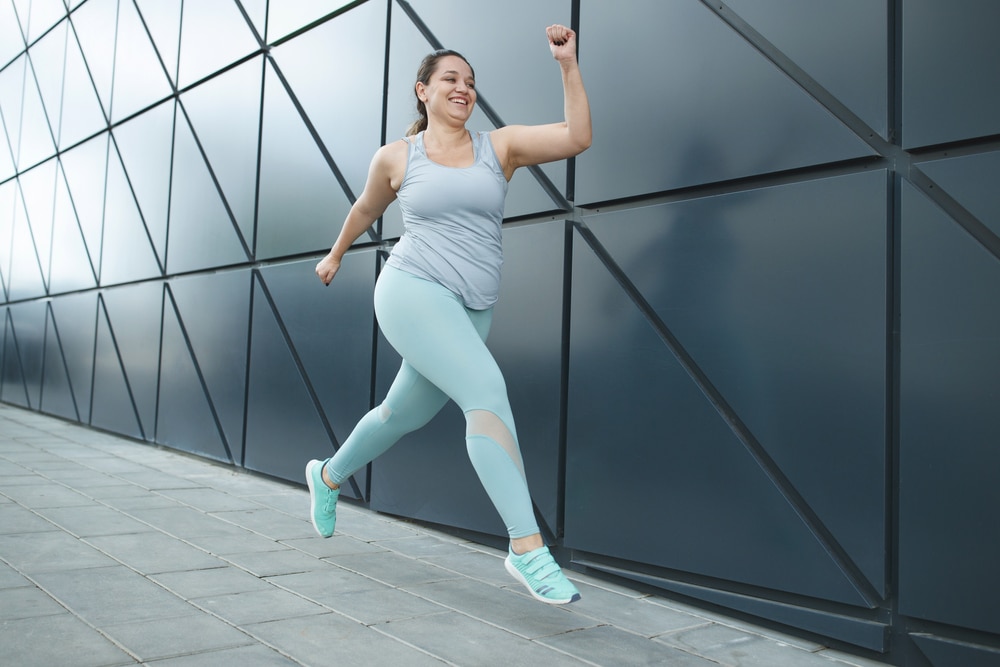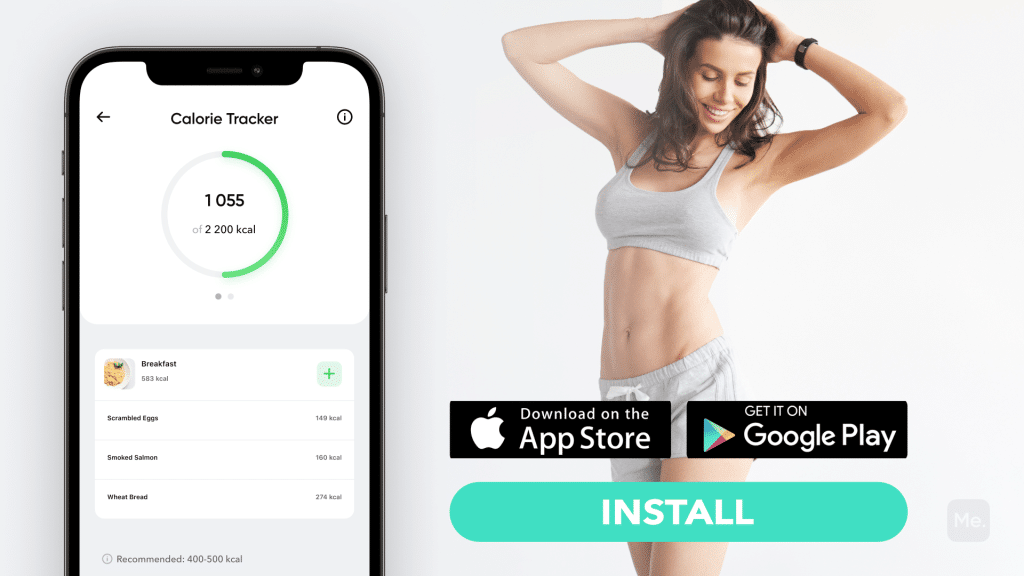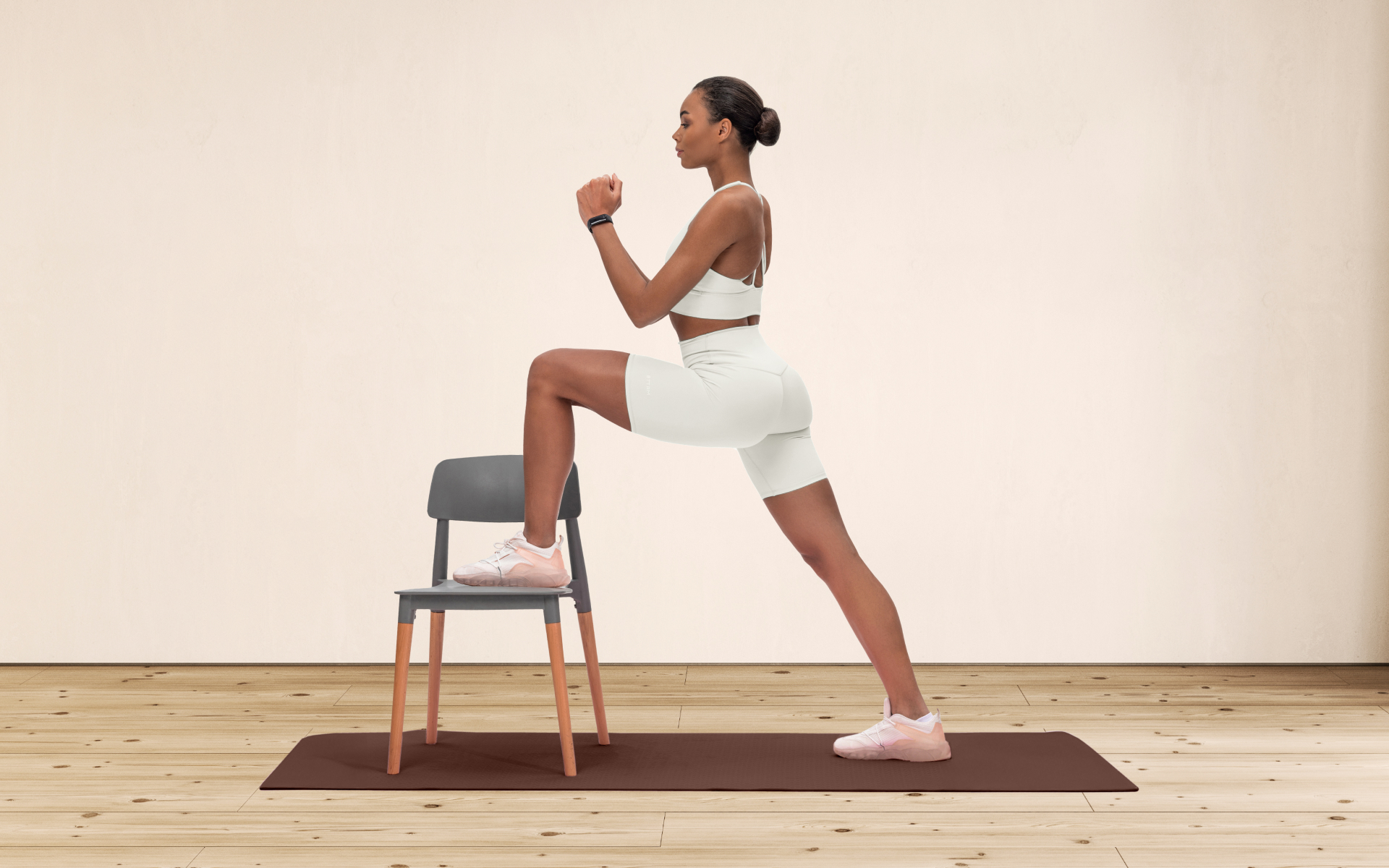There has been an assumption that runners have a specific body type. Regardless of what is advertised, runners come in all shapes and sizes. Do not be intimidated into dropping a running program because you’re overweight. Instead, it would help if you were motivated to take it up because running can help you get in shape and achieve a healthy weight. But before that you need to understand how to get started and develop a healthy and consistent running habit.
Is Running Actually A Good Way To Lose Weight?
When it comes to running, a lot has been said about it as a form of exercise for weight loss. For example, you may have heard that it is unsafe for overweight people or that it is hard for such people to have a regular schedule. As a result, one could conclude that overweight running is a no-no.
But science says otherwise. For a start, running is an excellent form of exercise to help you shed pounds. That is, as long as you burn more calories than you consume. Several studies have discovered the effectiveness of overweight running on weight loss. Here are some examples:
Study 1
Research findings from this study show that the primary focus of treating obesity is the concentration of purposeful weight loss (7). It recommends participation in physical activities for weight loss, such as running.
But independent of weight loss, the study also discovered emerging correlational data in people with obesity showing physical activity can improve other critical health markers (7). For example, the study revealed that epidemiologic studies noted (7):
- Physical activity in individuals with obesity increased cardiorespiratory and muscle fitness.
- People with obesity who participated in physical activity had a decreased risk of all-cause mortality and cardiovascular disease.
- Metabolically healthy but obese people had a lower risk of all-cause mortality, non-fatal and fatal cardiovascular disease and cancer mortality. That was in comparison to metabolically unhealthy obese individuals.
- An improvement in critical markers of health in overweight and normal-weight individuals, such as overall quality of life, cognition, brain health, memory, sleep, and anxiety (7).
Note that despite these findings, there are limited intervention studies specifically investigating health markers independent of weight loss as primary outcomes among individuals with obesity (7). Check in with your doctor before taking up a physical activity for any of the listed benefits independent of weight loss.
Study 2
In this study, researchers were interested in determining whether equivalent changes in moderate walking and vigorous running produces equivalent weight loss. So, the researchers set free-living, non-experimental conditions (3).
They discovered that although the BMI was significantly associated with changes in BMI vs exercised energy expenditure ran and walked. It was great for running (3). That said, you can shed more pounds while running rather than walking.
Read More: Running On An Empty Stomach: Is It All It’s Cracked Up To Be?
How Much Weight Do You Lose Running?
Because of how grueling running can be, it would be motivating to know the program is helping you lose tremendous weight. But here is the thing; you will not lose 10 pounds in a day or 20 pounds in a week.
Those are examples of rapid weight loss linked to several side effects. Expect a drop in a pound or two a week. Yes, it may not seem like much, but this is a safe and reasonable rate of weight loss.
Again, remember that losing one pound is not as easy as it sounds. Take a look at this weight loss overview to understand how you lose pounds. One pound is equivalent to 0.45 kilogram of fat (2).
How To Lose One Pound Weekly When Running?
To lose one pound, you would have to burn 3, 500 calories (2).It means you have to burn 500 calories a day so that you lose 3, 5000 calories by the end of the week (3, 500 calories/7 days).
Believe it or not, shedding 500 pounds a day is challenging. You will have to exercise and maintain a calorie deficit to help shed pounds. But again, Mayo Clinic acknowledges that losing 500 calories daily to meet this limit is not true for everyone.
You may find that even after cutting 500 calories from your diet daily you may only lose half a pound weekly. Mayo Clinic reveals such happens because weight loss also depends on your body, gender, activity level, and the amount of weight you want to lose (2).
How To Get Started With An Overweight Running Program?
Running is daunting, even for experienced marathoners. So, do not feel bad if you are hesitating to start your running routine. Here are some tips to help you lace up and get moving!
Consult
It would be best to check with your doctor before trying a running program, especially if you are overweight. Have your doctor assess your running plan, goals, health, and pre-existing conditions or injuries. Even if you find it irrelevant, having your doctor’s green light is important to minimize injury risk.
Do not be disappointed if your doctor recommends treadmill running instead of running outdoors. Stick to their plan as you start, and talk about your milestones with them for better guidance.
Learn The Correct Running Technique
The first and most important thing you must do is learn the correct running technique. Contrary to what most people think, there is a technique for running, just as there is one for strength lifting or dancing.
It would be best to seek the help of a trainer to help you learn the correct running technique for overweight individuals. Some of the highlights of the correct running technique include (6):
- Maintaining a forward gaze.
- Keeping your hands at your waist level.
- Relaxing your shoulders and hands.
- Using a short stride and taking small steps.
Start Slowly
Unfortunately, most beginners want to do too much too soon. For example, you may find an individual who wants to run 15 miles within an hour for a start. This is an unrealistic goal, especially if you are new to running or have been inactive for years.
Note that it takes time to be good at running or even accomplish one of your running goals. Do not force your body to do too much too soon while it is yet unprepared. This only warrants burnout (6). Set small achievable objectives leading you to this ultimate goal.
For example, you could start by learning the correct running technique to benefit and not injure yourself from the workout. Afterwards, you could start walking and gradually warm up to running as you feel comfortable (4).
Warm Up
Some people get straight into running without warming up their body muscles. The danger of such an approach is that with stiff muscles, injury risk increases and makes your muscles sore faster (4).
Before you start your running routine, warm up. You can try walking slowly for five to ten minutes if your routine is a fast walk (4). Alternatively, you can brisk walk or jog for 5 to 10 minutes as well if you are going for a run (4).
Start With A Walk-To-Run Program
The best way to get the hang of running and stick to it is by easing into it. Fitness experts recommend using a walk-to-run program for this purpose and also to build your motivation and endurance. But here is the problem; most people use this program and fail to progress.
Abide by the program and continuously add the time as instructed. It will make shifting to the running routine easier when that time comes.
Find Motivation
You may be discouraged from keeping up with your routine, especially if you do not see other fat people running. But remember that there is no specific running body type. Keep pushing until you attain your goals.
One of the best ways of finding the motivation to keep pushing is by seeking support. First, find a running buddy to help you stay accountable (4). Alternatively, you can seek the mentorship of any fat marathon runner you know.
The other way you can boost your motivation is by celebrating small wins. Celebrate and reward yourself when you accomplish your objectives, such as transitioning to a running plan full-time from a walk-to-run program. It helps you appreciate your efforts and helps you realize that you can achieve what is before you.
If you wish to cinch your waist, tone up your bat wings, blast away the muffin top – our fitness app was created to cater to all your needs! BetterMe won’t give excess weight a chance!
Make It A Habit
You will only stick to a running routine if you make it a habit. That is because habits are difficult to shake.
Make running a habit by planning your schedule and always showing up as required. The more you show up, the more your system recognizes it as a habit, which becomes difficult to do away with (4).
What To Eat When Following A Running Plan?
Eating before you run or exercise is crucial to give your body enough fuel to sustain you throughout your routine. But most runners find it challenging to consume the right nutrition or foods before and after their workouts.
It would help if you struck a balance between eating enough calories and having foods that will not upset your stomach (8). Here is a guide on what you can eat before, during, and after your running routine:
-
Before Running
Before running, it is crucial to consume little fiber and healthy fats, moderate amounts of protein, and high amounts of carbs (8). Aim at consuming 1 to 4 grams of carbohydrates per kg of body mass a few hours before your workout (8).
Two hours before your run, you can eat granola, whole grain toast with eggs, oats, bagels or breakfast muffins (9). But an hour before your run, you may want to eat something light, such as a small carbohydrate-rich snack, like a banana, to boost your energy levels (8).
-
While Running
For training runs under an hour, you do not have to refuel while on the move (10). But that is the case if you have eaten enough pre-workout foods to boost your energy levels. On the other hand, if you are running for over an hour, it would be best to consume small amounts of high GI carbs to help maintain your performance (10).
High glycemic foods have a GI of 70 and above. Examples of foods with such an index include rice cakes, white bread, bagels, crackers, croissants, cakes, doughnuts, and most packaged breakfast cereals (1). But remember that your aim should be to consume at least 30 to 60 grams of carbohydrates per hour if you run for 1 to 2.5 hours (8).
-
For A Race
It would be best to consume more carbohydrate-rich foods and drinks to help maintain intensity (10). But remember that the higher the intensity, the more carbs you will need (10). It is worth noting that you should consume carbs in the final eight weeks of training for a marathon (10).
Evidence suggests such an approach will train your gut and help you discover what works best for you (10). Research also suggests consuming easily absorbed carbs as they fuel the brain, helping you work harder, especially when your muscles tire (10).
-
After Running
Eating after your run is important for muscle recovery. But what you eat depends on how long you are running and the intensity of the run (8). Some foods work best for muscle restoration, bone strengthening, and inflammation reduction after a run, unlike others (11). Some of the best foods and drinks to have after your run include (11):
- Greek yogurt
- Oatmeal
- Avocado toast
- Tofu
- Eggs
- Tart cherries
- Whey protein
- Mixed Nuts
- Sardines
- Milk
- Pineapple juice
Read More: Smoking And Running: They Don’t Mix, Here’s Why
Nutrition And Fitness Tips When Overweight Running
Just because a gazelle makes running look easy does not mean it is. It is challenging, especially for beginners, which is why we have compiled these tips for you:
-
Listen To Your Body
Listening to your body when running is particularly important because it gives you contact feedback about your performance. Understanding and learning how to differentiate discomfort of endurance or hard effort from the pain of an injury is important.
Again, it is important to learn when you need to persevere and when you must stop and seek assistance or react accordingly. Please do not fool yourself by buying into the saying “no pain, no gain”.
-
Get The Right Running Gear
Comfort is key when running, so you may need to reassess your workout gear. Go for light yet comfortable clothes. For women, be sure to choose a high-support bra with cushioned straps to help distribute the weight evenly (5).
Choose comfortable shoes because running uses your leg muscles and stresses your bones, tendons and ligaments (5). The last thing you want is to be thrown off your game by an ill-fitting shoe. Note that cushioned shoes reduce joint impact while a firm midsole offers more stability (5).
Similarly, you can use compression gear to provide more support, cut down chafing, and reduce tissue bouncing when running. Talk to your trainer about this to minimize injury risk.
-
Schedule Rest Days
You need to take at least one full rest day in a week to help your muscles recover and grow. But here is the catch. When most people hear of rest days, they immediately think of relaxing all day on the couch. But fitness experts highly discourage that because it may not help you reach your weight loss goal (6).
They recommend partaking in cross-training activities such as swimming or cycling (6). These activities’ benefits are that they help you relax but burn calories when still giving your body a break from the intense running activity (6).
BetterMe is your fast-track ticket to a long-lasting weight loss! Tailor your fitness journey and maximize your results with just a couple of swipes!
-
Ignore And Avoid The Naysayers
Unfortunately, some people always find criticism in other people’s doings. For example, you may find them criticizing you for starting a running program, which could be demotivating and make you self-conscious. Remember that there is no specific feature that defines a runner.
Do not feel bad for your running speed or the distance you cover, even if other people try to make you feel about it. Stop worrying about what other people think and instead remind yourself of your long-term goal and how far you have come.
Remember that they may judge you from a day’s work without knowing where you started. Again, remember that some people may criticize you but not run, missing out on all the benefits you are reaping. In the end, it is easy to ignore them.
-
Create A Runner’s Diet Plan
Exercise and diet are like two peas in a pod. They go hand in hand, meaning you get the most from a workout plan while focusing on good nutrition. The best way you can make sure you are eating clean is by following a diet plan. You can create one with your nutritionist’s help to make sure you account for all your dietary and calorie requirements (8).
The Bottom Line
Overweight running is important because it promotes weight loss. It has also been associated with improving overall quality of life, sleep, memory, cognition, and brain health. But an individual must also focus on the right diet when running to trigger weight loss. It would be best to develop a runner’s diet plan with the help of your nutritionist to make it easier to follow.
Get your personalized
meal plan!
DISCLAIMER:
This article is intended for general informational purposes only and does not serve to address individual circumstances. It is not a substitute for professional advice or help and should not be relied on for making any kind of decision-making. Any action taken as a direct or indirect result of the information in this article is entirely at your own risk and is your sole responsibility.
BetterMe, its content staff, and its medical advisors accept no responsibility for inaccuracies, errors, misstatements, inconsistencies, or omissions and specifically disclaim any liability, loss or risk, personal, professional or otherwise, which may be incurred as a consequence, directly or indirectly, of the use and/or application of any content.
You should always seek the advice of your physician or other qualified health provider with any questions you may have regarding a medical condition or your specific situation. Never disregard professional medical advice or delay seeking it because of BetterMe content. If you suspect or think you may have a medical emergency, call your doctor.
SOURCES:
- A good guide to good carbs: The glycemic index (2021, health.harvard.edu)
- Counting calories: Get back to weight-loss basics (2022, mayoclinic.org)
- Greater Weight Loss from Running than Walking during 6.2-yr Prospective Follow-up (2014, ncbi.nlm.nih.gov)
- How to Start Running (2021, webmd.com)
- Running kit for plus-size runners (2021, runnersworld.com)
- The 5 most common running mistakes and how to fix them (2019, nbcnews.com)
- The Benefits of Physical Activity for People with Obesity, Independent of Weight Loss: A Systematic Review (2022, ncbi.nlm.nih.gov)
- What is a runner’s diet plan? (2021, medicalnewstoday.com)
- What to eat before your run (2020, bbcgoodfood.com)
- What to eat during your run (2016, bbcgoodfood.com)
- Wondering What to Eat After a Run? These 30 Foods Can Help Boost Recovery (2022, runnersworld.com)














